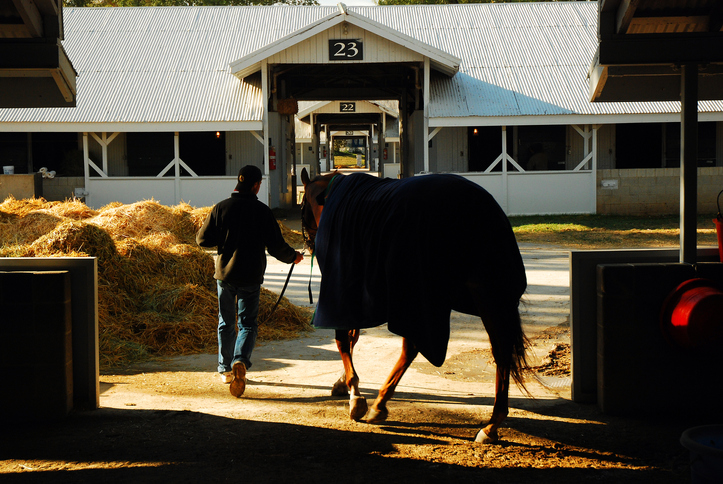In our busy modern world, buying and selling items online is both hugely popular and uber-convenient. And for members of the equestrian world, it can be even more so. Whether it’s horses, horseboxes, tack, clothing or equipment, many horse enthusiasts have to rely on the internet to quickly find items they’re searching for.
Unfortunately, while the vast majority of buyers and sellers are genuine, if you’re looking online then you’re at risk of being targeted by scammers. Many of whom can sound extremely plausible. In fact the National Fraud & Cyber Crime Reporting Centre, Action Fraud, has put out warnings to the equestrian community about such scams. Many victims have lost substantial amounts of money to scammers, being left both upset and out of pocket.
Read our Equesure guide to some of the most common scams both buyers and sellers need to watch out for. And how to protect yourself from becoming yet another victim of these criminals.
Reading up on the various horse scams is not the only way to protect yourself from financial loss and distress. By arranging horsebox insurance through Equesure you can make sure this expensive piece of kit is well protected from harm.

Avoiding scams – advice for buyers
- Never pay up front without viewing a horsebox (or anything else for that matter!)
We’ve all been there. Looking for the perfect horsebox just right for our equine friend. We’ve done all the research and know what we want, even if it is a bit out of our price range. And then we spot a new advertisement for exactly the thing we're looking for, but at a much lower price than others of a similar age and condition.
Thinking it’s our lucky day we contact the seller, but they say they’re sadly out of the country/in hospital/working away/visiting their poorly grandmother, so you can’t arrange a viewing in person. But don’t worry they’ll organise delivery to you immediately if you send them the money up front. They might even promise to throw in some extra tack they don’t need and a full refund if you’re not completely happy with the horsebox. How very helpful of them!
Remember, if something seems too good to be true, then it probably is. No matter how reasonable the excuses may sound or how tempting the deal is, don’t be caught out. It’s a scam! The supposed seller actually doesn’t have the thing they’re advertising. Or even if they do, they’re not going to send it to you! They’re simply going to take your hard-earned money and leave you with nothing to show for it – other than that awful feeling you’ve been taken advantage of. And the need to begin the horsebox search all over again.
- Never buy a horse without trying it yourself
It’s not just horseboxes or other equipment that scammers target. They play on victims’ hopes by advertising horses, too. When you read a horse advertisement it’s very easy to become emotionally invested in the horse. Particularly when they appear to be everything you’re looking for and a decent price, too. Just like with sought-after dog and cat breeds, some scammers will target popular horse breeds.
By the time you get to speak to the seller, they’ll say that because they’ve had so much interest and want to avoid time-wasters the only way for you to secure the horse is to send them a deposit. They may even try to convince you to pay the whole value of the horse without ever seeing it in person. Would a legitimate seller who truly cares about their equine agree to sell it to someone they haven’t even met yet?
Obviously, the seller may be legitimate and we can see why they might want to put off time-wasters or potential scam buyers! However, it’s really not wise to agree to buy a horse without even having met them. Even if the horse does exist, what if you’re not the right fit? It’s not a great start to a new life together!
- Research, research, research
Common advice in almost any equine situation is to do plenty of research beforehand. Not only into the horse, horsebox or other items but also into the seller themselves. Dodgy online sellers can give themselves away in many different ways.
For example, the Metropolitan Police advise that scammers often use stock images or other people’s images on their advert. Or use the same image on multiple websites or ads. Check if the images appear have been used elsewhere on the web through TinEye or Reverse.photos.
It’s also wise to check if the seller has any feedback from other buyers and whether the seller is, in fact, the owner. Or if they’re acting as an agent or middleman. This could affect your legal rights if the sale turns sour and make it harder to track down the scammer.
- Take someone else along to a viewing
Scammers often work best when they can get you on your own. It makes manipulation and deception much easier if they only have to fool one person rather than two. So, whenever you’re going to a viewing of a horse or a horsebox, take a friend or family member along with you. Not only is this wise in terms of personal safety but also because they can act as a witness to what is said. A dishonest seller could tell a lot of lies about a horse’s health or condition, but it’s difficult to prove if it’s just your word against theirs.
If it’s a horse or a horsebox you’re viewing, then try to take along someone who’s more knowledgeable than you. They might be able to spot something the untrained eye might miss.
And finally, meeting at a motorway service area or other strange location is not advised. It’s always best to go to the seller’s home or yard. Particularly when viewing horses, it’s important to see them in their home environment before parting with any cash.
- Check second-hand vehicles before you buy
If you’re buying any kind of second-hand vehicle, then it’s well worth performing vehicle checks to ensure you’re not buying one that’s stolen or has been written off. Unfortunately, horseboxes and other vehicles are a very lucrative target for thieves across the country. If you buy from a disreputable source then you’re adding to the problem. North Yorkshire police have some great advice on how horse owners can tighten up their stable yard security.
If you’re buying then be sure to take along our brilliant 20-point checklist for buying a second-hand horse trailer. Just like with buying the right horsebox insurance, it’s always vital to adopt a methodical approach to evaluating used horse trailers. You won’t regret using it and it could even prevent a costly mistake. That’s why contacting the insurance specialists at Equesure is always worthwhile.

Avoiding scams – advice for sellers
- Never share personal or payment details with someone who calls you
Imagine the scenario, you’ve recently booked a website or magazine advert to sell your horse or other equine-related item. You might have done this over the phone or online, but then you receive a call from someone claiming to be from the website or publication. They tell you they’re really sorry but the payment has failed to go through and you need to pay now or it won’t run.
No matter how convincing they sound, never share your payment details in these circumstances. Simply end the call and then call the company’s office on a different number. If there really is an issue with your advert, they’ll be sure to be able to help you.
But it’s not just payment details you need to be careful of. Anyone calling you and asking for personal information could well be a scammer looking for a way in. Don’t make it easy for them!
- Don’t click or download anything you don’t trust
Another scam that’s not just linked to horses is where you receive an email asking you to login into your online account via a link, or to confirm your account details. Even if the email or text message appears to be legitimate the danger is that the link will, in fact, take you to a fake website. These are designed to steal your personal information and must be avoided.
- Be wary of requests to buy without viewing
We all want a sale to be easy. But if a potential buyer contacts you out of the blue offering to pay the full price without even a viewing then it’s sensible to be suspicious.
Commonly what happens is that the ‘buyer’ will offer to send you a cheque for more than the full amount. Asking you to kindly send on the rest to the person who’ll be collecting the item for them. You do this, but then the cheque bounces and you’re left without a buyer, and without the money you sent on.
Top tips to avoid being hit by a horse scam
- Stay alert. Does it sound too good to be true? You know what to do!
- Download and read a scams protection checklist. Consumer champion Which? has an excellent one that’s applicable to all scams, not just those involving equines.
- Ask for help from someone you trust. Often an outsider might spot something you’ve missed. If in doubt, the Citizens Advice has an online scams helper that could be invaluable and save you from an unfortunate mistake. Or try a dedicated Scams Action adviser by calling 0808 250 5050. This free service is available from Monday to Friday, between 9am and 5pm.
- Use your common sense. One of the most painful parts of being scammed is the feeling you’ve acted foolishly. If anything about the buying or selling process seems ‘off’, then back away.
- Never give out personal or bank details to someone who’s called you.
- Always trade face-to-face for big purchases. That said, never carry large amounts of cash with you.
- For smaller items, pay via Paypal or other trusted payment providers for added protection. Bank transfers offer less protection in the event of a scam.
- Be wary of sudden offers to buy your horse or horsebox. Would you buy a horse or horsebox without even seeing it? Probably not.
- Never allow a potential buyer to test drive your vehicle alone. If you’re test driving, take along a friend if necessary, for safety.
- Never let someone take a horse, horsebox or any other item until you’ve received cleared funds in your bank account.
- Stay up to date on the latest scams. Action Fraud has published a number of case studies to highlight how scams have happened before. While popular equine magazines like Horse & Hound also commonly feature fraud alerts or news stories.
- If you think you’ve been a victim of fraud, report it to Action Fraud online or by calling 0300 123 2040. Fraud can happen to anyone no matter how savvy they are, so by reporting the fraud you can bring the scammers to justice.

Protect yourself with horsebox insurance
Whether you’re buying or selling a horsebox it’s important to remember a few essentials so the process goes off without a hitch. As well as looking out for common scams you’ll also want specialist horsebox insurance to cover you in case of unexpected events. You can even be covered for breakdown, too, if something happens while en route.
With over 60 years of experience in the equine insurance market, our team can find cover for a huge variety of makes and models of horsebox. From Equi-Trek, Tristar and Ascot to Empire, Ifor Williams and Alexanders, we’ve got it covered.
Other benefits can also include:
- Limited mileage discounts
- Windscreen cover on comprehensive policies
- Personal accident cover on comprehensive policies
- Values up to £750,000
- Legal cover available with all policies
- EU cover included on all policies
- Breakdown cover including vehicle and horse recovery
For insurance for your horsebox that suits your needs and budget, call Equesure today.






